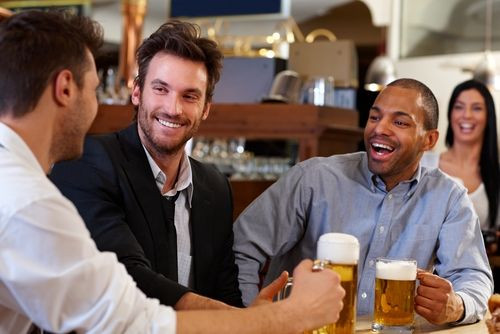Put A Smile On Your Face: Drinking Alcohol Makes Smiling Contagious For Men, Inducing 'Social Bravery'

The best way to guarantee a smile on a man’s face is not by cooking, going to a sports event, or wearing sexy lingerie, but by letting him drink a beer or a few with his friends. Typically, the majority of male bonding takes place within the context of alcohol consumption, which can sometimes lead to them expressing emotions. According to a recent study published in the journal Clinical Psychological Science, drinking alcohol makes smiling more contagious among men, increasing their sensitivity to rewarding social behaviors, thereby inducing “social bravery.”
Since the majority of men seek their social support and bonding via “social lubrication,” alcohol, this coincides with why men are 50 percent more likely to drink excessively than women. Most problem drinking among men occurs in social settings due to a need to “belong” and create social bonds with others. "Therefore, social motives may be highly relevant to the understanding of how alcohol problems develop,” said Catharine Fairbairn, lead researcher of the study and psychological scientist at the University of Pittsburgh, in the press release.
Fairbairn, along with Professor Michael Sayette and their colleagues, sought to explore whether social alcohol consumption was more rewarding to men than to women, and to delve into the idea that alcohol might actually “lubricate” social interaction among men. The researchers decided to focus on an objective non-verbal indicator of social bonding, examining the infectiousness of genuine, or Duchenne smiles. A total of 720 healthy social drinkers, between the ages of 21 and 28, were assigned to groups of three.
Each group was randomly assigned to receive a particular drink: an alcoholic beverage (vodka cranberry), a non-alcoholic beverage, or a non-alcoholic “placebo beverage" that was described as alcoholic. Vodka was smeared on the glass of the fake alcoholic drink and then floated with a few drops of Vodka on top of the drink to make it more believable. The participants were casually introduced and positioned around a table.
Video recordings were used to analyze the group's smiling behavior, along with the spread of smiles from one individual in a group to the next. The researchers made sure the beverages were distributed equal parts over time, since the participants were told to drink them at an even rate. The participants were also allowed to interact freely among one another.
The findings revealed alcohol significantly increased the contagiousness of smiles, but only for all-male groups, without a significant effect on emotional contagion for groups that contained any women. However, regardless of gender, it was found among the groups who received alcoholic beverages, a smile was more likely to be “caught” if those on the receiving end of the smile were heavy drinkers. The smiles seen were mostly associated with an increase in positive mood and social bonding and a decrease in negative mood.
The researchers believe men were more likely than women to catch the smile because alcohol induces a form of “social bravery,” for men, the Daily Mail reported. Alcohol disrupts the processes that would normally prevent them from responding to another person’s smile. Subconsciously, catching a person’s smile creates an illusion of “belonging” and fosters closer social bonds between the members of the group.
This study coincides with the findings of a 2012 study published in the journal Psychological Science, which found moderate amounts of alcohol — consumed in a social setting — can enhance positive emotions and social bonding while relieving negative emotions among those drinking. Alcohol stimulates social bonding, increases the amount of time people spend talking to one another, and reduces displays of negative emotions. Therefore, alcohol increases the likelihood of “golden moments.”
Drinking alcohol influences facial expression and speech behavior that can open a window to how we partake in social bonding — but let's consume responsibly.
Source: Aalen OO, Fairbairn CE, Frigessi A, Sayette MA. Alcohol and Emotional Contagion: An Examination of the Spreading of Smiles in Male and Female Drinking Groups. Clinical Psychological Science. 2014.



























